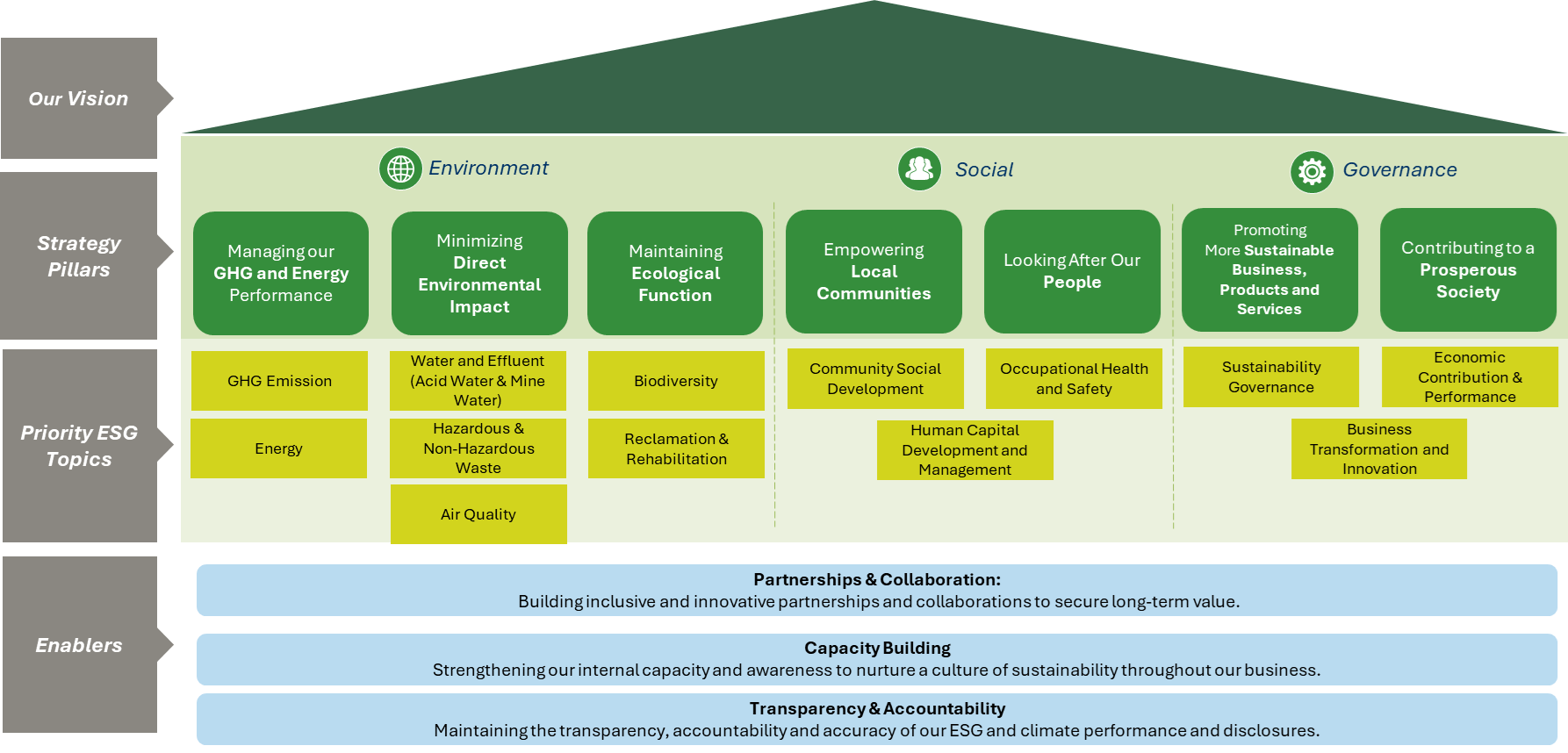

PT Adaro Minerals Indonesia Tbk (“AMI”) always incorporates the Environment, Social, and Governance (“ESG”) aspects in running each of its businesses and operational activities. AMI’s ESG commitment is addressed consistently through the implementation of the good mining practice, which includes environmental protection, strong corporate governance, and corporate social responsibility. The integration of the ESG aspects into the company’s operational activities affirms its commitment to making positive contributions to the creation of a sustainable future.
As a part of the Adaro Group with PT Adaro Energy Indonesia Tbk as the parent company, AMI fully supports the Group’s commitment to Net Zero Emission (“NZE”) achievement.
The Adaro Group's Commitment
The Adaro Group fully supports the Indonesian government’s commitment to reduce greenhouse gas (GHG) emissions, including measures to achieve NZE in 2060 or earlier through various measures. The Adaro Group has calculated the GHG emissions produced by our operational activities (scope 1 and scope 2) and continues to conduct various GHG emission reduction / sequestration measures.
These measures are in alignment with the Adaro Group’s internal transition target for 2030. Through AMI, the target will be achieved by expanding the business in areas that support Indonesia’s green economic ecosystem, including the development of an aluminum smelter, exploring opportunities in various green mineral products, growing our renewable energy business and expanding the markets for metallurgical coal, which is essential material for steel production.
As its commitment to the actions aligned with the Sustainable Development Goals (“SDGs”), within operational activities, AMI develops planning, implementation, monitoring, and evaluation on SDGs.
Additionally, through its subsidiary PT Maruwai Coal (“MC”), AMI also implements an integrated management system that includes topics such as environment, occupational health and safety, energy, and greenhouse gas (GHG). Such commitment is presented here (original policy signed in Indonesian).
ESG Strategy Framework

Being a part of the Adaro Group, AMI is equipped with the group’s ESG strategy framework that includes and addresses all ESG material topics in a holistic manner. This strategy framework, which also includes the “enablers”, or actions that form the foundation for the roadmap, i.e. the ESG programs and initiatives, has been composed to identify, address, and manage ESG risks through three ESG components: social, environment, and governance, thus can serve as the media for the stakeholders to understand AMI’s ESG strategies.
Sustainability Vision
The Adaro Group’s commitment to sustainability drives the way AMI conducts its businesses and manages ESG subjects and matters with SDGs as the driving force. The Adaro Group also has ESG initiatives with the following vision:
“To lead with purpose towards a sustainable future”
Sustainability Missions
Sustainability Strategies
The general strategies implemented to achieve the sustainability vision are:
Material Topics
Integrating ESG aspects into AMI’s operational activities requires a holistic consideration on the topics considered material for the company’s businesses. Therefore, the company has identified the material topics representing the most significant impacts on the economic, environmental, and social aspects using the Global Reporting Initiatives (GRI) standard guideline.
Material topics have been determined by distributing questionnaires to the internal and external stakeholders on the potentially relevant topics. Out of the findings of the questionnaires, material topics are sorted based on their degree of importance and impacts, for the review and approval by AMI’s BoD members.
In 2023, AMI determined 15 material topics perceived to be of high priority for the internal and external stakeholders.